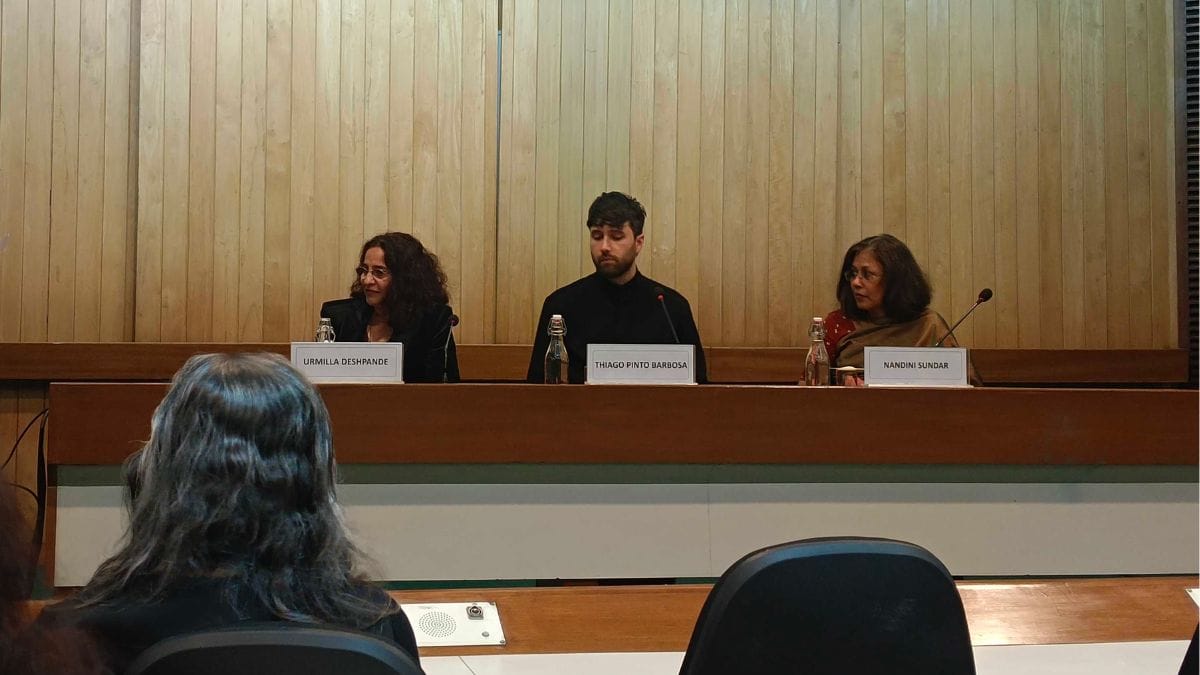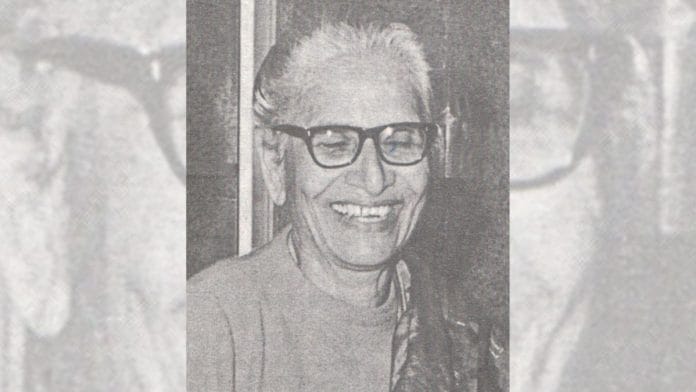New Delhi: When Irawati Karve examined the skulls from Germany, East Africa, Rwanda, and Tanzania, she looked into their eye sockets. She would try and imagine their eyes, hair, smile—the people they once were. That’s what made Karve a remarkable sociologist.
More than half a century after her death in 1970, her great granddaughter Urmilla Deshpande co-authored a biography, Iru: The Remarkable Life of Irawati Karve (2024), celebrating India’s first female anthropologist.
“Sometimes she conjured up a man, sometimes a woman, sometimes a girl. And once, when it was a very small skull, she imagined a baby who had never walked on its own feet,” Deshpande read a passage at an event on 8 February at India Habitat Centre.
Iru, which Deshpande wrote with anthropologist Thiago Pinto Barbosa, is more than just a deep dive into Karve‘s life. The authors relied on storytelling and ‘creative speculation’ to fill in the gaps. This use of critical fabulation was bolstered by solid research on Karve’s life and her writings, originally in Marathi.

The topic of conversation immediately went down the path of fact and fiction. Barbosa described critical fabulation as a strategy used when writing about historical events. It’s often relied on as a redressal mechanism for history’s omission of the marginalised. It involves using research and creativity to fill in the gaps and craft a story that is both historically accurate and narratively rich, he added.
“We didn’t want to write a boring biography. We wanted to write something that would discuss science and anthropology, but also explore the personal side of this person, because there were so many aspects. I collected many personal stories about her during my research,” Barbosa said.
The authors collected several anecdotes by speaking with Karve’s family, friends, and the professors she worked with in India. To better understand her life, they also travelled to her university in Berlin and took walks through the streets that she described in her writings.
“[Iru is] written like a novel about someone who herself wrote novels, who wrote Yuganta, a wonderful novelistic recreation of women in the Mahabharata,” said Nandini Sundar, sociology professor at the Delhi School of Economics, during a panel discussion at the event.
Disproving a Nazi eugenics theory
Karve challenged the dominant scientific theories of her time. Barbosa explained that during her doctoral studies in Berlin, she worked under Eugen Fischer, a German eugenics professor and member of the Nazi Party. Fischer claimed that the skulls of Europeans had a more developed right side, at the time thought to be a sign of civilisation.
Karve challenged Fischer’s racial theory. In response, the German professor asked her to prove the point.
“She went on to examine different skulls from various places, and proved that there was no correlation between the right side of the skull being bigger or smaller and race,” explained Barbosa.
After reading about this, Barbosa became interested in Karve’s life and started researching her work.
One of the key topics of conversation was Irawati Karve’s personal and intellectual journey.
The event highlighted Karve’s personal reflections as much as her scholarly work. Her Marathi essays reveal a different side of her, where she questions spirituality, religious practices, and social norms. Most often, however, Karve chose to write about the beauty of nature, from clouds in Germany to the grass in England.
“She was writing about things she felt and her personal experiences in Marathi, which she approached differently from her academic work in English,” said Deshpande.
Also read: Sardar Patel transformed ‘steal frame’ to steel frame. IAS officers must revisit his legacy
A balancing game
Karve’s life as an anthropologist was as unconventional as it was groundbreaking. But she straddled personal and professional commitments with ease.
“She would leave her youngest daughter behind because she was too little. But she would sometimes take her older children with her to assist in the fieldwork,” said Deshpande.
Despite the demands of her career, Karve made time for her personal interests, such as swimming and birdwatching, which were also reflected in her writing.
“She achieved decades ago what women today often still struggle to achieve—a career, marriage, and motherhood—that are all equally fulfilling and complement each other,” Deshpande said.
Another striking aspect of Karve’s life was her openness to changing her views, which she exemplified throughout her life. “She used to be anti-Islamic and also said that she would never allow her son to marry a German woman. She was also against divorce.”
With time, however, Karve became a completely different person. “She changed her mind on everything.”
Also read: This event about diplomacy wasn’t about ambassadors. Their spouses were the stars
A public anthropologist
With a jazz performance by Karve’s great grandson, Tissa Khosla, the event was as much a personal, familial celebration of Karve as it was an acknowledgement of her impact as an anthropologist.
The evening concluded with a moment of reflection on the breadth of her work and her lasting influence on the field of anthropology.
Recalling some of Karve’s Marathi radio interviews, Sundar explained how Karve always wanted to make an impact as an anthropologist.
“I owe no debt to society other than my work, and that’s the way I’m going to repay it—through my anthropology,” Karve said in one of these interviews.
Karve was always vocal about social and political issues, and the situation of women in India, which she demonstrated through her writings. However, she never considered herself a reformer.
“So, in a way, when you say that she was a public anthropologist, she was also very consciously not a public reformer,” said Sundar.
(Edited by Prasanna Bachchhav)






